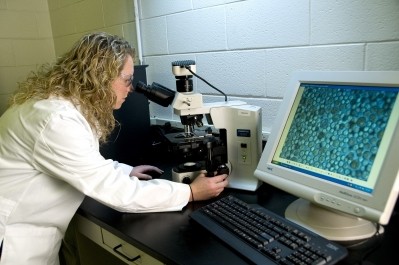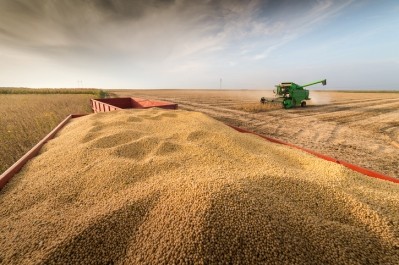'Flaxseed oil better than ground version for fatty acid egg enrichment'

ADM wanted to found out how a flaxseed oil feed supplement it produced compared to the use of ground flaxseed in terms of boosting omega-3 levels in eggs; it funded a study at Iowa State University and Virginia Tech, which has been published in the journal Poultry Science.
Use of flax oil was thought to be more efficient than ground, whole flaxseed, said Kristjan Bregendahl, poultry technical manager for ADM Animal Nutrition. “The availability (or digestibility) of the omega-3 fatty acids are believed to be lower in the whole seeds (even when ground) than that of the flax oil,” he added.
“The research compared the transfer of omega-3 fatty acids from whole, ground flaxseeds versus that of ADM flax oil,” he told FeedNavigator. “Researchers with Iowa State also examined the metabolizable energy (ME) levels in the flax oil during the project.
The team of researchers concluded that when adding the same concentrations of flaxseed oil or milled flaxseed there was a higher level of alpha-linolenic acid (ALA), EPA and DHA - eicosapentaenoic acid and docosahexaenoic acid respectively - in the egg yolk from birds getting diets supplemented with the oil.
“Therefore, using flax oil instead of flaxseed in the feed for laying hens can improve the efficiency of omega-3 transfer from the feed to the eggs, strengthening profit potential for the egg producer,” added Bregendahl.
Additionally, use of the flaxseed oil was found to increase feed efficiency linearly, while increasing amounts of milled flaxseed in bird diets decreased feed efficiency, the researchers said.
However, the metabolizable energy (ME) content for the flax oil was not as high as had been hypothesized, said Bregendahl.
Study details
Hens have the ability to transfer omega-3 fatty acids from their diets to the yolks of the eggs they produce, the researchers said. They also are able to convert ALA into the more sought after omega-3 fatty acids EPA and DHA.
Ground flaxseed is known to be a source of ALA and has been used in poultry diets to enrich meat and eggs with omega-3 fatty acids, they said. However, there is a limit to how much can be added to a bird’s diet before negatively affecting feed efficiency and bird performance.
Less is known about the potential use of a flaxseed product to enrich eggs, they said. During the feeding trial, 132 birds were given one of 11 diets for a period of 8 weeks.
Diets were formulated to provide similar amounts of energy and nutrients, said Bregendahl.
“The ADM flax oil was included at 0.5, 1, 2, 3, and 5% in the diets,” he said. “Whereas, the whole, ground flaxseed (itself containing 34% oil) was included in the diets at 1.5, 3, 6, 9, and 15%, so as to match the flax-oil contents from the oil diets.”
“In other words, the 0.5% flax-oil diet contained the same amount of flax oil as did the 1.5% whole-flaxseed diet, and so on,” he added.
A control diet incorporating corn and soybean meal and oil was also used, said the researchers. In the experimental diets, flaxseed oil replaced some of the soybean oil.
Eggs were collected daily, average daily feed intake was recorded and feed efficiency was calculated, they said. Pooled sample egg yolks were examined at weeks 4, 6 and 8.
At the end of the feeding trial, all birds were tracked in a 2-week study to establish the apparent metabolizable energy (AME) of flaxseed oil, they said.
Enrichment findings
Overall, the omega-3 fatty acid amount found in the yolk of eggs produced by chickens getting diets supplemented with either the flax oil or ground flaxseed seed increased linearly as the amount of either supplement in the diet grew, said Bregendahl.
“However, the increase was two times greater when the ADM flax oil was fed,” he said.
Egg yolks, from birds getting the control diet had about 2% omega-3 fatty acids, he said. Those getting the ground, whole flaxseed supplement saw levels increase up to 5%, and those on the flax oil had 10% omega-3 fatty acid in the yolk.
“The amount of omega-3 fatty acids in the whole eggs depends on how much omega-3 fatty acids the hens consume,” he said. “But, the hens need to consume less of some feed ingredients than others to enrich the eggs with a given amount of omega-3 fatty acids.”
Feed intake was similar for birds on all diets, said the researchers. However, feed efficiency was found to increase as additional flaxseed oil was added to the diet while it declined with higher amounts of milled flaxseed.
Birds getting both types of supplemented diets saw a slowing of bodyweight gain as more supplement was added, but change in body weight was more pronounced for birds getting the milled flaxseed additive, they said.
Looking forward, additional work is being done to further assess the energy value of ADM’s flax oil, said Bregendahl. “The measured energy content of the ADM flax oil in the Iowa State University experiment was unexpectedly low (3,400 kcal/lb),” he added.
“This value was much lower than expected (about 4,000 kcal/lb),” he said. “Therefore, the next step was to measure the energy content of the ADM flax oil in a separate experiment.”
An initial follow-up project determined that the energy value of the flax oil was similar to the energy value provided by soybean oil or corn oil, about 3,900 ± 50 kcal/lb, he added.
Source: Poultry Science
Title: Comparative omega-3 fatty acid enrichment of egg yolks from first-cycle laying hens fed flaxseed oil or ground flaxseed
Authors: I. Ehr, M. Persia, and E. Bobeck
DOI: http://dx.doi.org/10.3382/ps/pew462















